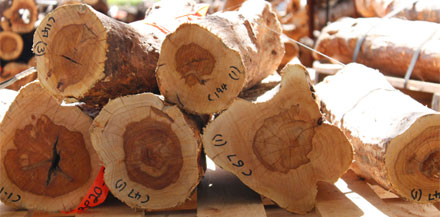The world’s biggest producer of Indian sandalwood is on track to complete its largest commercial harvest on record in Western Australia’s Kimberley region. By the end of the month, Quintis will have harvested 256 hectares of the exotic timber in the Ord Irrigation Scheme, approximately 3,200 kilometres north of Perth. Sources: ABC News, Timberbiz
Quintis CEO Richard Henfrey said the harvest milestone was the culmination of more than two decades of hard work to establish a sustainable source of Indian sandalwood in northern Australia.
“There’s great interest in being able to source this product in the volumes that we can supply that’s ethical, legally grown and that’s traceable,” he said.
“These trees were planted 15 years ago [and] we’ve worked over the course of that time to crossbreed and to improve the genetics.
“We expect the yield per hectare and the amount of the kilos of heartwood to go up significantly over the next two years.
“The 2021 harvest included trees from a Managed Investment Scheme which will go to tender, as well as trees owned by Quintis.
From its Packsaddle plantation, the logs are trucked to the nearby Kununurra processing facility, where the sweet scent of sandalwood wafts through the air as it is dried, graded and fed through grinding equipment.
Following the tender process, much of the high-quality timber purchased by Quintis will be trucked more than 3,500 kilometres south to the company’s facility at Mount Romance near Albany, which is home to the world’s largest sandalwood oil distillery.
Quintis manages more than 12,000 hectares of plantations across Northern Australia and employs more than 150 staff in its forestry operations in WA, the Northern Territory and Queensland.
The company has established key markets all over the world including Australia, China, Europe, India, Korea, Japan and the USA.
Since the first harvest in 2013, more than 500 hectares of Indian sandalwood has been harvested in the Ord Valley and that number was set to grow significantly as they worked towards expanding harvest operations over the next five years.
Major competitor Santanol, owned by global forestry giant Mercer International,
was also expected to produce up to 10,000 kg of Indian sandalwood oil this year, after completing its own record harvest in the Ord in 2020.
Both companies were investigating new ways to make forestry in the region more sustainable, including the creation of a biochar product made from leftover biomass material to reduce greenhouse emissions and improve soil health.
Mature trees absorb 21 kilograms of carbon dioxide per annum; Quintis has estimated their trees remove over 115,000 tonnes of CO2 from the earth’s atmosphere each year.






